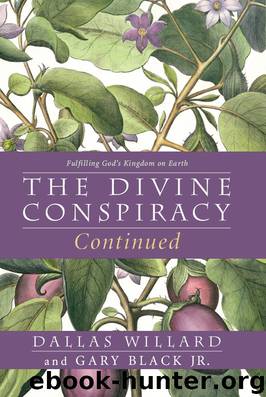The Divine Conspiracy Continued by Dallas Willard & Gary Black Jr

Author:Dallas Willard & Gary Black Jr.
Language: eng
Format: epub
Publisher: HarperCollinsPublishers
STEWARDSHIP
God certainly maintains great interest in all human enterprise. The scriptures support the concept of understanding economic, social, religious, and political responsibilities as that of stewardship. Stewards work both for God and for the benefit of everyone involved. One difficulty for us in contemporary life is the limited use of our words and a lack of understanding regarding their historical definitions and reach. This is true for our current use of the words “economy” and “steward,” and therefore it is critical to distinguish and more accurately define each.1
Our economy is a much more sophisticated phenomenon than we are often led to believe. Economies are much broader and deeper social systems than what we typically hear about on the evening news regarding the number of jobs lost or gained, the increase or decrease in interest rates from central banks, the level of taxation, or the degree of consumer confidence in any given quarter. An economy is holistically defined as the system in which the “goods” and “services” that human beings—within a certain location—regard as necessary for life and living are created and exchanged.2 This includes, but is not exclusive to the interest and scope of influence related to our governments.
Another misconception about economic matters is the idea that economics is limited to money matters or governmental fiscal policy. Though today there is a tendency for the news media and political leaders to focus on these topics, in fact economists pursue questions such as how people live together; what is regarded as acceptable housing; how we think about and practice education, warfare, or national security; and the freedom needed to live our lives and make essential decisions on a multitude of social, familial, and personal issues. These and many other activities involve some exchange of goods, services, protections, legal agreements, and relational arrangements, all of which amount to much more than money, fiscal policy, or trade agreements between nations.
Economists are in a crucial professional leadership position in our world today and stand in a unique position to offer us information much more valuable than the direction the stock market will likely take over the next fiscal quarter. As a society we should look to the field of economics to assist us in grasping a broad vision of what “rules and customs” we consciously and often unconsciously apply in our family life, communities, nations, and world. Such “insider information” is both necessary and wonderfully beneficial.
Additionally, a major objective in free (liberal) democratic societies such as the United States has been for individuals, families, and groups to attain and maintain the liberty required for self-determination. Such independence has historically been tied to and included self-supporting economic sufficiency. This is why economic freedom—living independently of outside resources—has become increasingly tied to political freedom.
Obviously there will be those who require assistance from the community and are dependent in some ways for their well-being or “welfare” on others. To respond to this is the nature of mercy. Acts of mercy attempt to ameliorate the exceptional tragedies of life that overwhelm people’s resources, both material and spiritual.
Download
This site does not store any files on its server. We only index and link to content provided by other sites. Please contact the content providers to delete copyright contents if any and email us, we'll remove relevant links or contents immediately.
The Lost Art of Listening by Michael P. Nichols(7506)
Why I Am Not A Calvinist by Dr. Peter S. Ruckman(4153)
The Rosicrucians by Christopher McIntosh(3519)
Wicca: a guide for the solitary practitioner by Scott Cunningham(3178)
Signature in the Cell: DNA and the Evidence for Intelligent Design by Stephen C. Meyer(3138)
Real Sex by Lauren F. Winner(3022)
The Holy Spirit by Billy Graham(2952)
To Light a Sacred Flame by Silver RavenWolf(2823)
The End of Faith by Sam Harris(2742)
The Gnostic Gospels by Pagels Elaine(2531)
Waking Up by Sam Harris(2460)
Nine Parts of Desire by Geraldine Brooks(2368)
Jesus by Paul Johnson(2362)
Devil, The by Almond Philip C(2331)
The God delusion by Richard Dawkins(2309)
Heavens on Earth by Michael Shermer(2284)
Kundalini by Gopi Krishna(2184)
Chosen by God by R. C. Sproul(2164)
The Nature of Consciousness by Rupert Spira(2108)
